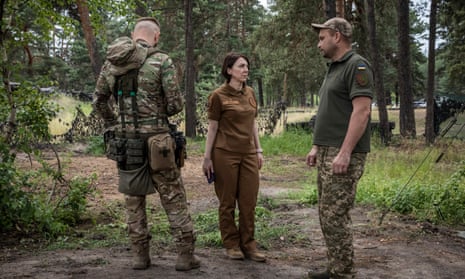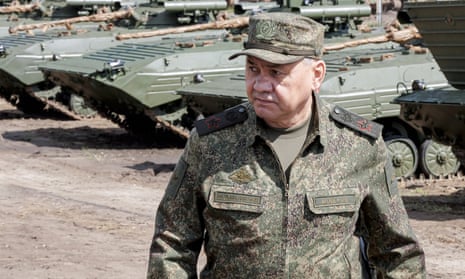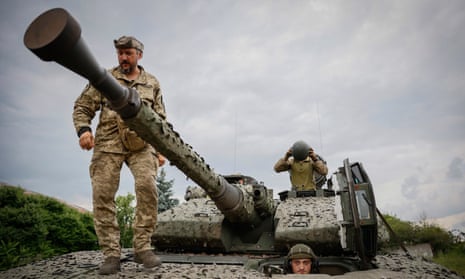Russian defence minister Shoigu visits troops in Ukraine
Russian defence minister Sergei Shoigu has visited troops in Ukraine, Russian news agency Ria has reported, his first public appearance since the Wagner mutiny at the weekend.
Shoigu has not commented on the rebellion, during which Wagner head Yevgeny Prigozhin demanded that the defence minister meet him in Rostov before calling off the mutiny.
In a post on Telegram, Ria reported that Shoigu met Colonel-General Nikiforov, commander of the ‘western’ grouping:
The minister also paid special attention to the organization of support for the troops involved in the special military operation and the creation of conditions for the safe deployment of personnel.
Key events
Ukraine has reclaimed some 130 square kilometres (50 square miles) from Russian forces along the southern front line since the start of the counteroffensive, Ukrainian deputy defence minister Hanna Maliar has said according to Reuters.
“The situation in the south has not undergone significant changes over the past week,” Maliar told the national broadcaster.
She added that along the eastern part of the front line, which includes the Lyman, Bakhmut, Avdiivka and Maryinka directions, about 250 combat clashes had taken place over the past week.

A bit more context on Sergei Shoigu, the Russian defence minister who in many ways was at the centre of the Wagner rebellion.
As the Guardian’s Pjotr Sauer explained in this report on Wagner leader Yevgeny Prigozhin’s accusations against the leadership of the Russian military, the pair have been at loggerheads for months.
Prigozhin has repeatedly accused the defence ministry of denying him the ammunition his men needed in Ukraine and of sacrificing Russian soldiers in missions doomed to fail.
But in a series of audio messages beginning on Thursday and continuing on Friday, Prigozhin also accused the ministry of lying to the public about its justifications for invading Ukraine.
The invasion had nothing to do with denazifying Ukraine nor was it launched because Ukraine was about to attack Russia – rather it was due to Shoigu’s desire for a second “hero of Russia” medal, he said.
“What was the war for? The war needed for Shoigu to receive a hero star … The oligarchic clan that rules Russia needed the war,” Prigozhin said.
“The mentally ill scumbags decided: ‘It’s OK, we’ll throw in a few thousand more Russian men as cannon fodder. They’ll die under artillery fire, but we’ll get what we want,’” Prigozhin continued.
The Kremlin “likely risks Prigozhin’s armed rebellion expanding the window of acceptable anti-Kremlin criticism,” the Institute for the Study of War has said in its latest analysis, particularly if the Kremlin does not retaliate further against the Wagner leader.
The US thinktank used the example of a pre-planned meeting by the ultranationalist Angry Patriots Club in Moscow on Sunday, at which former Russian officer Igor Girkin reiterated that Putin needs to legally transfer certain presidential authorities to other parties if he is unwilling to assume control over the war in Ukraine as the supreme commander-in-chief.
Officials were likely aware of the event as the club had been promoting it for weeks, the ISW noted, adding:
If the Kremlin intends to use Prigozhin’s rebellion as pretext to start immediately suppressing antagonistic ultranationalists, then this event would have likely been a prime candidate to start that effort …
The Kremlin’s continued careful response to the armed rebellion will likely prompt other Russian nationalists to test Russian official reactions to more explicitly critical rhetoric.

Daniel Hurst
The Australian government has pledged a new $110m military assistance package in the next round of support for Ukraine, including vehicles, ammunition and humanitarian funding.
“This package responds to Ukraine’s requests for vehicles and ammunition, and will make a tangible difference on the battlefield,” the prime minister, Anthony Albanese, said in a statement.
Canberra has committed 70 military vehicles, including 28 M113 armoured vehicles, 14 special operations vehicles, 28 MAN 40M medium trucks and 14 trailers; a new supply of 105mm artillery ammunition; and $10m to the UN Office for the Coordination of Humanitarian Affairs – for the Ukraine Humanitarian Fund – to assist in the provision of shelter, health services, water and sanitation.
“We support international efforts to ensure [Russian president Vladimir] Putin’s aggression fails and that Ukraine’s sovereignty and territorial integrity prevails,” Albanese said.
The government said the latest commitment took Australia’s total contribution to Ukraine to $790m, including $610m in military assistance.
Russian defence minister Shoigu visits troops in Ukraine
Russian defence minister Sergei Shoigu has visited troops in Ukraine, Russian news agency Ria has reported, his first public appearance since the Wagner mutiny at the weekend.
Shoigu has not commented on the rebellion, during which Wagner head Yevgeny Prigozhin demanded that the defence minister meet him in Rostov before calling off the mutiny.
In a post on Telegram, Ria reported that Shoigu met Colonel-General Nikiforov, commander of the ‘western’ grouping:
The minister also paid special attention to the organization of support for the troops involved in the special military operation and the creation of conditions for the safe deployment of personnel.

Russian rouble at weakest point since March 2022
The Russian rouble has opened at a near 15-month low against the dollar in early morning trade on Monday, responding for the first time to the Wagner mutiny, according to Reuters.
By 0415 GMT, the rouble was 2.1% weaker against the dollar at 86.50, after earlier hitting 87.2300, its weakest point since late March 2022. It had lost 2.2% to trade at 94.37 versus the euro and shed 2.1% against the yuan to 11.95.
More from Reuters:
With the rouble not trading over the weekend, Russian banks were offering exchange rates well above official rate beyond 90 to the dollar.
Monday’s full trading session begins at 0700 GMT. Investors globally were watching for ripple effects from the aborted mutiny, with some expecting a move into safe havens such as US government bonds and the dollar.
Brent crude oil, a global benchmark for Russia’s main export, was up 0.2% at $74.03 a barrel.
Ukraine advances up to 1km near Bakhmut
Ukraine’s military says it has advanced between 600 metres and 1,000 metres on the southern and northern flanks around Bakhmut, the city which was taken by Wagner forces in May.
The military also reported advances in the area on Saturday, as Wagner forces were marching on Moscow. It was not possible to verify the reports.
AFP reported fierce clashes in the area on Sunday, with Ukrainian soldiers telling the news agency that the Wagner mutiny had not noticeably affected fighting in the area.
“As it attacked yesterday, Russia continued to attack today,” one soldier said, adding. “Most people, most military, understand very well that the circus from Russia is still here.” Another said that for Ukraine, the fighting was going “according to plan”.
Kyiv has said that the unrest in Russia offered a “window of opportunity” for its long-awaited counter-offensive.

Opening summary
Hello and welcome to the Guardian’s live coverage of the war in Ukraine and the crisis in Russia.
Ukraine’s military says it has advanced between 600 metres and 1,000 metres on the southern and northern flanks around Bakhmut, the city which was taken by Wagner forces in May. The military also reported advances in the area on Saturday, as Wagner forces were marching on Moscow. It was not possible to verify the reports.
AFP reported fierce clashes in the area on Sunday, with Ukrainian soldiers telling the news agency that the Wagner mutiny had not noticeably affected fighting in the area. “As it attacked yesterday, Russia continued to attack today,” one soldier said, while another said that for Ukraine, the fighting was going “according to plan”.
The Russian rouble has opened at a near 15-month low against the dollar in early morning trading on Monday, responding for the first time to the rebellion.
At 0402 GMT, the rouble was 2.1% weaker against the dollar at 86.37, hitting 86.8800 on market opening, its weakest point since late March 2022, Reuters reported.
In other key developments:
-
US secretary of state Antony Blinken has said the Wagner uprising showed “real cracks” in Vladimir Putin’s government and may offer Ukraine a crucial advantage as it conducts a counteroffensive that could influence the outcome of the war. “This is an unfolding story and I think we’re in the midst of a moving picture,” Blinken told the CBS News programme Face the Nation. “We haven’t seen the last act.”
-
There has been no word from Putin or Wagner leader Yevgeny Prigozhin since the rebellion ended and their whereabouts are unclear. Putin appeared on Russian state TV on Sunday but the comments appeared to have been recorded before the mutiny. In an interview broadcast on state television he made no reference to the rebellion but renewed his commitment to the war in Ukraine, calling the “special military operation” his top priority.
-
Lithuanian president Gitanas Nausėda warned that Nato would need to strengthen its eastern flank if Prigozhin is exiled to Belarus as agreed with Moscow. Following a state security council meeting on the mercenary group’s attempt to revolt against Russian military leadership, Nausėda said: “If Prigozhin or part of the Wagner group ends up in Belarus with unclear plans and unclear intentions, it will only mean that we need to further strengthen the security of our eastern borders.”
-
State television also said Putin would attend a meeting of Russia’s Security Council this week, without elaborating. Belarus’ Belta news agency said Putin and President Alexander Lukashenko, who negotiated with Prigozhin to end the mutiny, spoke again on Sunday, after at least two calls on Saturday.
-
The weekend’s events have “exposed the weakness of Putin’s regime”, Ukraine’s president, Volodymyr Zelenskiy, has said, saying he had discussed the turmoil in Russia in a phone call with the US president, Joe Biden. In a statement, Zelenskiy called for global pressure to be exerted on Russia and said that he and Biden had also discussed expanding defence cooperation with an emphasis on long-range weapons.
-
The Ukrainian president said he had also held “positive conversations” with Canadian prime minister Justin Trudeau and Polish president Andrzej Duda. They discussed “hostilities on the frontline” and the “further strengthening of Ukrainian troops”.
-
France’s president, Emmanuel Macron, said that the revolt highlighted divisions within the Russian government. Speaking to the Provence newspaper on Sunday, Macron said that Wagner’s march to Moscow “shows the divisions that exist within the Russian camp, and the fragility of both its military and its auxiliary forces.”
-
Ukraine’s defence minister, Oleksii Reznikov, said he spoke to US defence secretary Lloyd Austin on Sunday, and described the Russian authorities as “weak”. Reznikov wrote on Twitter: “We talked about recent events in Russia. We agree that the Russian authorities are weak and that withdrawing Russian troops from Ukraine is the best choice for the Kremlin. Russia would be better served to address its own issues.”
-
Russian officials said that houses and roads had been damaged because of the rebellion by the Wagner mercenaries. Nineteen houses had been damaged in the village of Yelizavetovka as a result of a firefight involving Wagner forces while about 10,000 square metres of roads in Rostov had been damaged by tank tracks.

